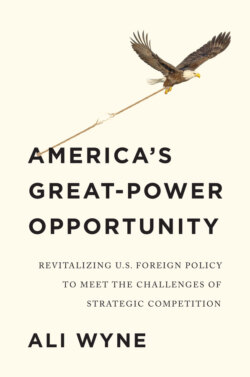America's Great-Power Opportunity

Реклама. ООО «ЛитРес», ИНН: 7719571260.
Оглавление
Ali Wyne. America's Great-Power Opportunity
CONTENTS
Guide
Pages
America’s Great-Power Opportunity. Revitalizing US Foreign Policy to Meet the Challenges of Strategic Competition
Acknowledgments
Preface
Notes to Preface
1 Searching for a Post-Cold War Ballast
The Rise of a Unifying Construct
A Pyrrhic Victory?
The Search for a New Anchor
Aggression in Europe and Tension in Asia
The Follies of Triumphalism
The Need for an Affirmative Vision
A Critique and an Alternative
Notes
2 Drawing Historical Analogies
1930s Redux?
A New Cold War?
The Lessons and Limits of Analogies
Notes
3 Probing Great-Power Competition
The Competition Snowball
The Elusiveness of Victory
The Possibility of Boundless Competition
A Superpower’s Anxiety
Quiet Confidence
Notes
4 Managing a Resurgent China
An Unprecedented Psychological Test
Growing US Unease
Distrust in the Time of Pandemic
A New US “Consensus” on China Policy?
The Debate over China’s Intentions
Internal Obstacles to “National Rejuvenation”
China’s Self-Encircling Diplomacy
China’s Sputnik Moment
The Core of the World’s Central Competition
China’s Narrative Momentum
An Asymmetric Approach to a Limited Competitor
Realistic Expectations of Allies and Partners
The Need for Domestic Renewal
The Inescapability of Cohabitation
Notes
5 Assessing Russia’s Conduct and the Sino-Russian Entente
The Debate over Russia’s Greatness
Strategic Opportunism
An Incremental Escape from the Security Dilemma
Russia as “Hurricane” and China as “Climate Change”
The Improbability of Wedges
A Limited Entente
A Chronic Condition
Notes
6 Seizing America’s Great-Power Opportunity
Eight Principles to Inform US Foreign Policy. PRINCIPLE 1 Prioritize the renewal of the United States’ unique competitive advantages
PRINCIPLE 2 Regard the power of America’s domestic example not as a supplement to external competitiveness, but as a precondition for it
PRINCIPLE 3 Do not use external competition as a crutch when undertaking internal renewal
PRINCIPLE 4 Frame internal renewal as an explicit objective of US foreign policy, not as a desired byproduct
PRINCIPLE 5 Enlist allies and partners in affirmative undertakings
PRINCIPLE 6 Appreciate the limits to America’s unilateral influence
PRINCIPLE 7 Pursue cooperative possibilities that can temper the destabilizing effects of great-power competition
PRINCIPLE 8 Rebalance in earnest toward the Asia-Pacific, with an economic focus
America’s Great-Power Opportunity
Notes
Afterword
Notes
Index. A
B
C
D
E
F
G
H
I
J
K
L
M
N
O
P
Q
R
S
T
U
V
W
X
Y
Z
POLITY END USER LICENSE AGREEMENT
Отрывок из книги
Ali Wyne
Elmira Bayrasli played an invaluable role in the completion of this book. I realized soon after I began formulating my proposal that I would need an extended period of uninterrupted time to grapple with great-power competition in a considered manner. The only way I would secure such a window would be to step down from a rewarding job I had at the time, not knowing when I would next find a position. Elmira gave me the courage I needed to take that leap of faith, impressing upon me that some of life’s most compelling opportunities arise when we take a detour and trust that we will be able to navigate the attendant uncertainty.
.....
China’s resurgence and Russia’s revanchism were hardly America’s only foreign policy concerns during the second term of the Obama administration. The Islamic State was wreaking havoc across the Middle East and North Africa and, by late 2014, controlled roughly 100,000 square kilometers of territory, primarily in Iraq and Syria.41 North Korea continued to make progress toward mating a nuclear warhead to an intercontinental ballistic missile and conducted two nuclear tests in 2016. Finally, on June 23, 2016, with 52 percent of voters in favor, the United Kingdom moved to leave the European Union, casting doubts on America’s “special relationship” and on the resilience of the European project.
Still, China and Russia began to occupy increasingly central roles in US foreign policy thinking, especially within the defense community. In December 2015, Deputy Secretary of Defense Robert Work stated that the revival of great-power competition would be “the most stressing” challenge over the coming quarter-century. Tasked with implementing the “third offset” strategy that Chuck Hagel, the former secretary of defense, had announced in November 2014, Work argued that “Russia and China present the United States, our allies, and our partners with unique and increasingly stressing military capabilities and operational challenges.”42
.....